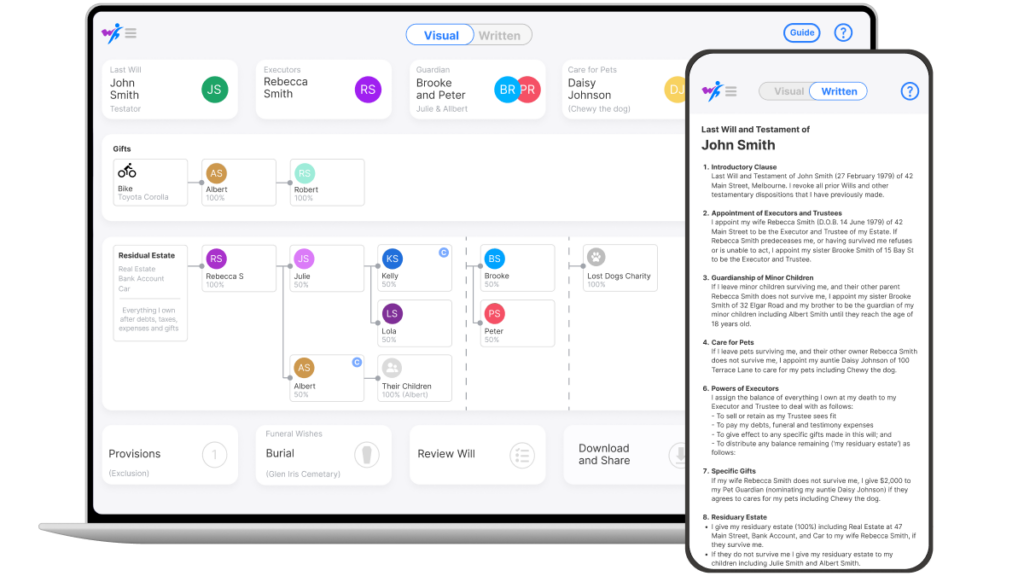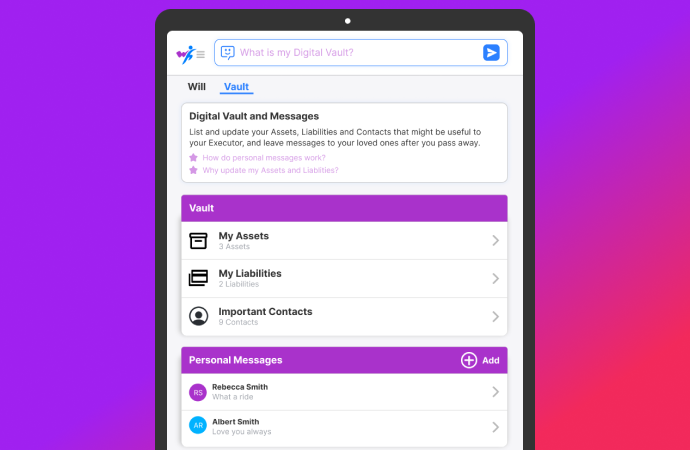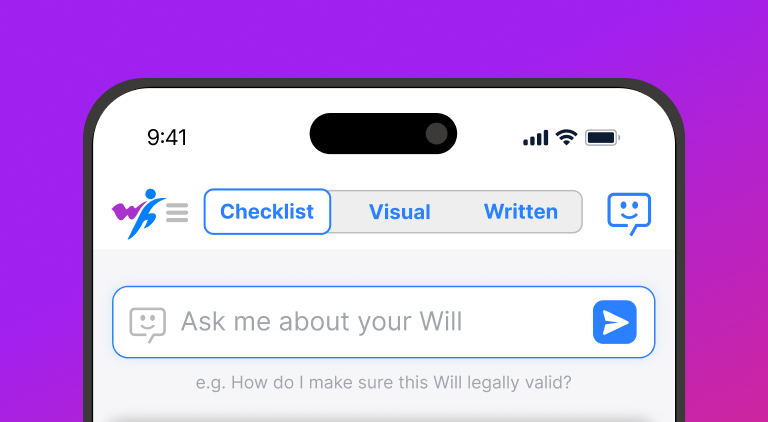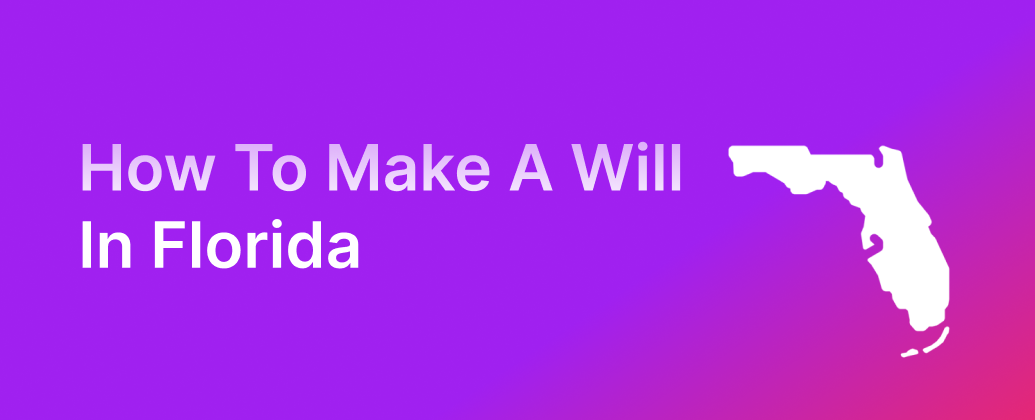
How To Make a Will in Florida
Step-By-Step Guide for creating a Last Will and Testament In Florida
Introduction: What is a Will?
A will is a legal document that outlines how your property and assets will be distributed after your death. It also allows you to make important decisions about your family’s future, such as naming guardians for your minor children to ensure their care. Without a will, the state of Florida will determine how your estate is divided, which may not align with your wishes.
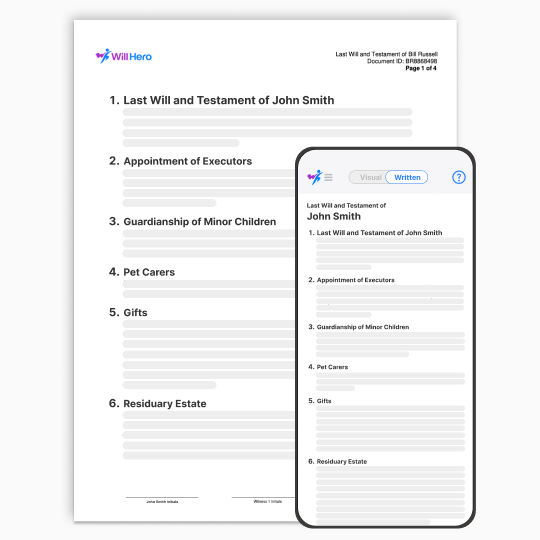
Laws for Creating a Will in Florida
When making a will in Florida, you must adhere to specific legal requirements. Failing to meet these criteria could result in your will being invalid, causing complications during probate. Below are the key legal requirements for creating a Will in Florida:

You must be at least 18 years old. (Or an emancipated minor).

You must be of sound mind:
This means you understand what a Will is, what your assets are, and how you are distributing them.

The Will must be in writing:
Oral Wills and handwritten (holographic) Wills are not recognized in Florida. Your Will must be a physical document – either typed or handwritten – and it must be signed by you and two competent witnesses.
By adhering to Florida’s will laws, you can ensure your estate is distributed according to your wishes. If your will doesn’t meet these legal requirements, it could be challenged or deemed invalid, potentially leaving your estate’s fate in the hands of the court.
Step-by-Step:
How to Draft Your Will in Florida
1. Choose an Executor
An executor is responsible for carrying out the terms of your will and managing your estate after your death. They ensure your assets are distributed according to your instructions, settle any outstanding debts, and manage the legal steps necessary to finalize the estate.
When selecting an executor, look for someone who is organized, trustworthy, and capable of handling the responsibilities. Many people choose a family member, close friend, or a professional advisor for this role.
It’s wise to name a backup executor in case your first choice is unable or unwilling to serve.
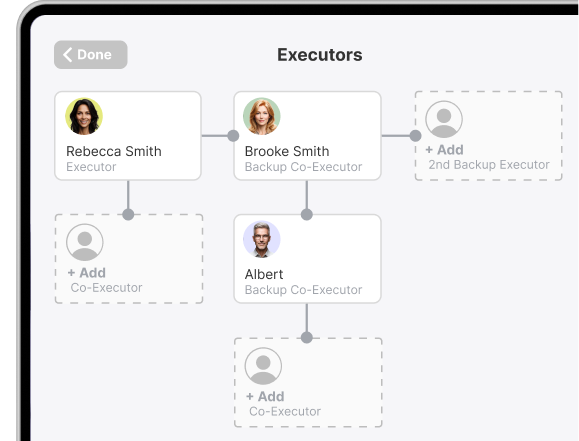
2. Name a Guardian for Minor Children
If you have minor children (or are planning to in the future), it’s important to name a guardian to care for them in the event of your death. The guardian will be responsible for their upbringing, including making key decisions about their education, healthcare, and overall well-being.
While naming a guardian is optional, it’s a critical decision for parents. In Florida, if you don’t designate a guardian, the court will appoint one, which may not align with your preferences.
It’s also advisable to name a backup guardian in case your first choice is unable or unwilling to fulfill the role.
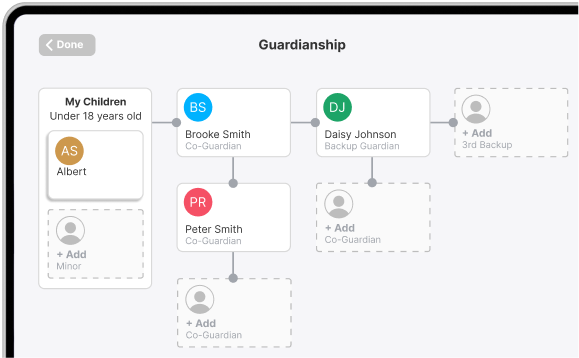
3. Name a Pet Carer
Florida law allows you to include provisions in your will for the care of your pets. You can designate someone to care for them and allocate resources for their upkeep, ensuring your pets are properly cared for after your passing.
While this step is optional, it’s an important consideration for your pets. In Florida, if you don’t name a pet caregiver or guardian in your will, the responsibility for their care will fall to your executor. By naming a specific individual, you can ensure that your furry loved ones are cared for according to your wishes.
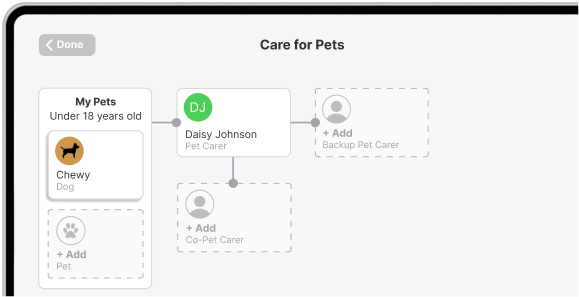
4. Decide who inherits your Residual Estate
The residuary estate refers to what remains after specific gifts and expenses have been deducted. You can choose one or more beneficiaries—such as family members, friends, or charitable organizations—to receive these remaining assets. Be sure to clearly list their full legal names and specify the percentage or share each beneficiary should receive. It’s also a good idea to name alternate beneficiaries in case your primary choices are unable or unwilling to accept the inheritance, ensuring a smooth distribution of your estate.

5. Gifting Specific Items
If you have specific items—such as family heirlooms, jewelry, property or cash—that you want to leave to a particular person, you can designate them in your will. Be as detailed as possible to prevent any confusion or disputes later on. Providing descriptions, appraisals, or serial numbers can help with clarity. It’s a good practice to take an inventory of all your assets before drafting your will to ensure nothing is overlooked.

6. Any Additional Instructions or Provisions?
It’s optional to include special instructions, such as how you’d like your funeral to be conducted or instructions to sell an asset. You might also wish make a gift conditional, or leave a fund in trust until any beneficiaries reach a certain age.
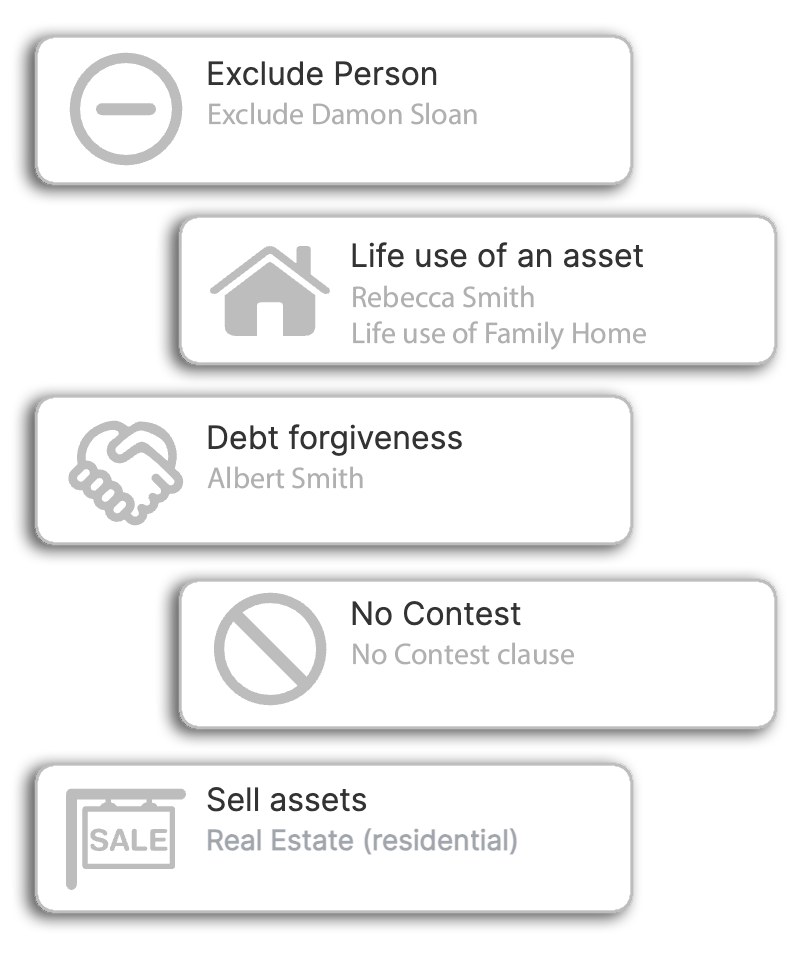
Review Your Will
Confirming Roles in Your Will
Before finalizing your will in Florida, it’s crucial to confirm with your chosen executors, guardians, and pet caregivers that they understand and are willing to take those responsibilities. This ensures that each individual is prepared and agrees to fulfill their responsibilities, reducing potential complications in administering your will.
It is best practice to confirm with the people nominated in the roles below, along with their backups that they are agree to take on this responsibility:

Executors
Guardians
Pet Carers
Test Your Will
Before you complete your Will, it’s important you think through your wishes and see if you have planned for different potential scenarios, such as people in your Will passing away before you, or conditions not being met.
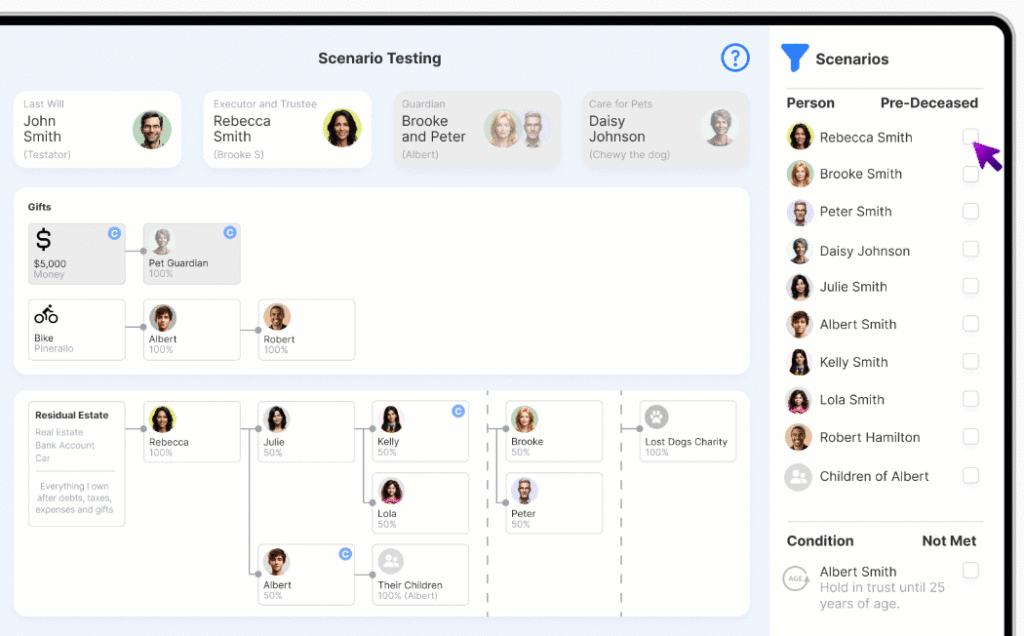
Signing Your Will (Making it Legally Valid)
Signing Your Will In Front of Witnesses
Once your will is drafted, the next critical step is printing and signing it. In Florida, the signing process must meet specific legal requirements for the Will to be valid.
Witness Requirements
In Florida, to create a valid Will, you must sign the document in the presence of at least two witnesses. These witnesses must:
- Be at least 18 years old.
- Be sound of mind and understand that they are witnessing the signing of your will.
- Both witnesses must also sign the will after you have signed it, attesting that they were present and that you appeared to be of sound mind when signing.
Note: Witnesses can be named as beneficiaries in Florida, but in doing so may increase the risk of disputes, so it is generally recommended to choose disinterested witnesses.
Witnesses vs Notaries
Although a will does not need to be notarized to be legally binding in Florida, many opt to have it notarized to create a “self-proving” will. A self-proving will can expedite probate by allowing the court to accept it as authentic without requiring the witnesses to testify. While notarization is optional, it can simplify the probate process.
Florida Electronic Wills Act
The Florida Electronic Wills Act, enacted in 2020, allows wills to be created, signed, and stored electronically, using remote audio-video technology for witnessing and notarization. However, electronic wills created under this act may not be recognized in all other states, as each state has its own laws regarding the validity of wills. If you have property or beneficiaries in other states, it’s essential to consult an attorney to ensure your electronic will is legally enforceable across jurisdictions.
Storing Your Will
Keep Your Will Safe
After your will has been signed and witnessed, it’s crucial to store the original document securely. In Florida, only the original signed copy of your will is legally binding, not a digital version. Losing or damaging this document could lead to complications for your loved ones and delay the distribution of your estate.
Here are some options for storing your will securely:
Store at Home
Best practice is a fireproof safe. You can also leave your will in the care of a trusted family member or friend, making sure they understand the importance of safeguarding the document.
With an Attorney
Many attorneys offer secure storage services for original wills.
Trusted Person
Ensure they understand the responsibility of safeguarding the document.
Although you can store documents online for convenience, remember only the original signed will is legally valid (unless it is in accordance with the Florida Electronic Wills Act). Make sure your executor knows where to find the physical copy to avoid legal issues.
FAQs: Making A Will in Florida
1. What Are My Options for Making a Will in Florida?
In Florida, there are several ways to create a will:
Hiring a Lawyer: Best for complex estates or if you need personalized legal advice. Attorneys can assist with estate tax planning, trusts, and specialized needs.
Using an Online Platform: For straightforward estates, online will platforms like Will Hero offer an affordable, guided process to create a legally valid will.
Handwritten Will: Florida allows handwritten wills that are signed in accordance with State laws, however these can be more easily contested, as they often lack witnesses and clarity. Florida does not recognize holographic wills, which are handwritten wills that lack proper witness signatures. For a handwritten will to be valid in Florida, it must still be signed by two witnesses, just like a typed will.
2. Do I Need a Lawyer to Make a Will in Florida?
No, you don’t need a lawyer to create a valid will in Florida. If your estate is simple and your instructions are clear, you can use an online platform or even create a handwritten will. However, for more complex estates, or if you have concerns about tax planning or trusts, seeking legal advice from an attorney can be beneficial to ensure your will is legally sound and comprehensive.
3. Are Handwritten (Holographic) Wills Valid in Florida?
No, holographic wills—wills written entirely in the testator’s handwriting without witnesses—are not valid in Florida under any circumstances. For a will to be legally binding in Florida, it must be signed by the testator in the presence of at least two witnesses. While handwritten wills may be valid in some states, Florida law requires that even handwritten wills meet the same witness requirements as typed wills to be considered legally enforceable.
4. How Much Is the Inheritance Tax in Florida?
Florida does not impose a state inheritance tax. However, the federal estate tax may apply to estates exceeding the federal exemption threshold, which is $12.92 million (as of 2023). Estates valued below this amount are not subject to federal estate taxes. If your estate surpasses this threshold, it could be taxed at the federal level. Consulting a tax professional or attorney is advisable if you’re concerned about potential estate taxes or complex estate planning.
5. Do I Need to Notarize My Will in Florida?
No, Florida does not require wills to be notarized to be legally valid. However, you must have at least two witnesses who are present when you sign your will, and they must also sign it. While notarizing a will can create a “self-proving” document, which might expedite the probate process, notarization is not required under Florida law.
6. Can I Change My Will After It’s Signed?
Yes, you can change or update your will at any time, as long as you are of sound mind. There are two main ways to do this:
- Add a Codicil: A codicil is a legal amendment to your existing will. It must be signed and witnessed just like the original will.
- Create a New Will: Draft a new will that explicitly revokes all prior wills and codicils. Once signed, destroy any old copies to avoid confusion or disputes.
7. What Happens if I die without a Will?
If you die without a will in Florida, your estate will be distributed according to the state’s intestate succession laws. This means your assets will go to your closest legal relatives, as determined by law. If no close relatives are found, the state may take possession of your property. Additionally, if you have minor children, the court will appoint a guardian, which may not align with your preferences. Having a will allows you to make these important decisions yourself.
8. What is Probate?
Probate is the legal process that takes place after someone dies to ensure their will is valid and their estate is distributed according to their wishes (or according to state law if there’s no will).
In Florida, probate generally involves the following steps:
Filing the Will: After someone passes away, their will must be filed with the local probate court, along with a petition to open probate. If there’s no will, a petition for intestate succession is filed instead.
Appointment of an Executor: If a will exists, the executor named in the document will be appointed to oversee the estate. If no executor is named, the court will appoint one. If there’s no will, the court will appoint an administrator to handle the estate.
Inventory of Assets: The executor is responsible for identifying and valuing the deceased person’s assets. This includes property, bank accounts, investments, personal belongings, and any debts owed.
Paying Debts and Taxes: Before distributing the estate to beneficiaries, the executor must ensure all outstanding debts, taxes, and expenses are paid. This may include mortgages, credit card bills, medical expenses, and estate taxes, if applicable.
Distribution of the Estate: Once debts and expenses are paid, the remaining assets are distributed to the beneficiaries named in the will. If there’s no will, the assets are distributed according to Florida’s intestate succession laws.
Closing the Estate: After the assets have been distributed and all obligations are met, the executor will file a final petition with the court to close the probate process.
9. How Long Does Probate Take?
The probate process in Florida can take anywhere from several months to a few years, depending on the complexity of the estate, any disputes among beneficiaries, and whether or not the will is contested. On average, probate usually takes about 9-18 months to complete.
10. Can Probate Be Avoided?
Some assets can bypass probate through mechanisms like:
- Joint ownership with right of survivorship: For example, property held in joint tenancy will automatically pass to the surviving owner.
- Beneficiary designations: Assets like life insurance policies, retirement accounts, and payable-on-death accounts with designated beneficiaries don’t need to go through probate.
- Living trusts: A living trust allows you to transfer ownership of your assets into the trust while you’re alive. The trust then holds those assets for your benefit during your lifetime and transfers them to your designated beneficiaries after your death. Since the assets are owned by the trust, not by you personally, they don’t need to go through probate. It’s important to ensure that all your assets, such as real estate, bank accounts, and investments, are properly moved into the trust for this benefit to apply.
Ready to Start your Will?
For many, just getting started is the hardest part. If you need to help taking the first step then Will Hero can help you get started. It’s free to draft a Will visually, see and understand what you want your wishes to be, become educated about Wills and estate planning with guides and our AI Assistant. You can also test your Will under different potential circumstances with a free account using Scenario Testing. Only when you are happy with your Will and wish to review the written document is an Upgrade required. Will Hero is on a quest to make Will creation more visual, interactive and even fun, as opposed to difficult and daunting.
However you wish to make your Will, get started today and protect your loved ones and your legacy.
